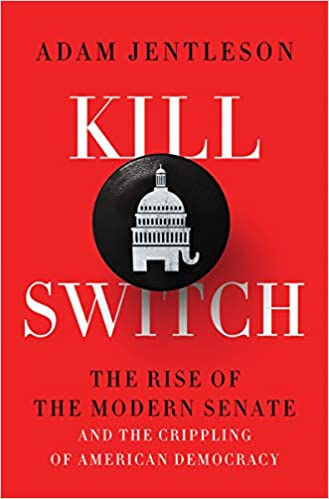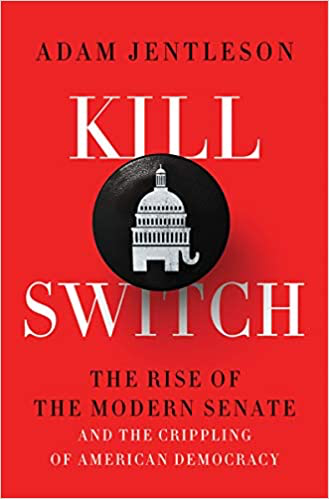Adam Jentleson, Kill Switch: The Rise of the Modern Senate and the Crippling of American Democracy

By Walter Horn

Adam Jentleson Kill Switch: The Rise of the Modern State and the Crippling of American Democracy.
'No public business of any kind could possibly be done at any time without the acquiescence of the Circumlocution Office. Its finger was in the largest public pie, and in the smallest public tart. It was equally impossible to do the plainest right and to undo the plainest wrong without the express authority of the Circumlocution Office'.
Charles Dickens, Little Dorrit
The Jentleson family has been involved in high-level American politics and policy for a long time. Bruce Jentleson, the father of the author of the book being reviewed here, is a distinguished academic and was a campaign aide to Presidential Candidate Al Gore when his son Adam was studying history at Columbia. A few years later, in 2004 and 2008, Adam was writing speeches for two other Democratic also-rans, John Kerry and John Edwards. Then it was the dad’s turn again: he was a foreign policy consultant to Hillary Clinton during her 2016 run. While Jentleson perehas been a leading foreign policy expert for years, working with Madeleine Albright, serving as head of the Sanford Institute of Public Policy at Duke University, and writing a number of highly regarded books on diplomacy, Jentleson filsopted to turn his knowledge of U.S. history and speech-writing skills to a job in Senate Majority Leader Harry Reid’s office, and, more recently, to authoring a highly readable book about the Senate’s steady descent into blatant iniquity. A true believer in the idea of a thoughtful and just “upper branch,” it clearly pains Jentleson that what he conceives might have been a noble bastion of deliberative democracy eventually turned into the primary governmental shield of white supremacists. As he painstakingly explains, the Senate has achieved its position as a sort of U.S. Circumlocution Office by having several ingenious leaders figure out how to wield immense power without any need of a supporting majority—either within the national electorate or even among its own members. As Jentleson tells it, even the ghost of “Founding Father” James Madison, a man who was only a lukewarm defender of majority rule himself, must weep at what has been made of his once illustrious American version of the British House of Lords.
The book certainly shows his father’s influence. For example, the elder Jentleson expresses grave concerns about the danger of too-powerful executives in an article about Donald Trump’s early forays into foreign affairs.[1]According to that account, we often find tendencies toward selfishness, abuse of power, and an utter lack of concern for those who may be hurt by various policy choices, even when those others are ostensibly allies. Adam notices similar shortcomings exhibited by a long line of Senate Presidents. In addition, one can detect a faith in what we may call traditional altruistic liberalism in both men. No doubt many readers will find this an appealing familial attribute; I think, however, that it may also be responsible for some of the naivete noticeable in Kill Switch.
The main subject of Jentleson’s book is the Senate Filibuster, a device that can be used to require the support of a supermajority of 60 Senators to pass something in that august chamber, rather than a simple majority of 51 votes. Since the Senate is currently evenly split (although Vice President Harris can break a 50-50 tie), almost nothing can be passed if the Senate President doesn’t like it, regardless of what the House and the U.S. President (to say nothing of the general populace) may want. And the steady development of the mechanism into its present grotesquery is set forth in great detail. As Jentleson notes, this result was neither suggested nor foreseen by the writers of the Constitution (though it was not prevented either), and in the 19thCentury, when anti-majoritarian rules began to be regularly utilized in the Senate, delay was the main goal. Back then, nobody even suggested the patent absurdity that a (ostensibly constitutional) piece of legislation wanted by the President and majorities of both the House and the Senate should be allowed to be stopped by 41 obstructionist Senators. But southern slavery sympathizers as well as others who happened to be content with the status quo at any given time discovered that anti-democratic rules can be very useful when a majority is interested in altering something that is currently being enjoyed. Jentleson defends the claim that James Madison, one of the heroes of the anti-majority-tyranny crowd, was himself partial to majority rule, but even if he’s right about that, I don’t find that appeal to authority entirely convincing. Madison was certainly fearful of majorities, in particular the propertyless variety. During the Constitutional Convention of 1787, when discussing who should be allowed to vote, he worried that the future would certainly bring a day in which “the great majority of the people will not only be without landed, but any other sort of, property.”[1]He worried that when that day dawns, “the rights of property and public liberty” will not be secure. It seems fairly clear that if Madison could live with the use of majority rule in the new union, it was because he believed that the huge polity would be so full of cross-cutting majorities that no single one of them could get up to too much mischief. In addition, he had faith in his plan to separate executive, legislative and judicial powers—in conjunction, of course, with a bicameral legislature. With all of his various Rube Goldberg-style mechanisms in place, he thought that we need not be too worried even if each legislative branch was stuck with majority rule.
In any case, it’s not Madison to whom true believers in democracy should turn to make their case on this issue (although Jentleson clearly uses Madison partly to make points with so-called conservatives who like to claim that sainted “Founder” as their progenitor); it’s Thomas Hobbes. Hobbes wasn’t wedded to the idea of democracy himself, but he understood what it means to actually have it. In his 1651 Leviathan he explained that, “[I]f the Representative consist of many men, the voyce of the greater number must be considered as the voyce of them all. For if the lesser number pronounce (for example) in the Affirmative, and the greater in the Negative, there will be Negatives more than enough to destroy the affirmatives; and thereby the excesse of Negatives, standing uncontradicted, are the only voyce the Representative hath.” In a word, democracy requires majority rule—not just occasionally but in every instance.
Jentleson is pained by many unfortunate episodes in American history. But he leavens this sorry story with engrossing portraits of such Senate luminaries as Lyndon Johnson, Dick Russell, Jesse Helms, Mitch McConnell, Chuck Schumer, and his own former boss, Harry Reid. The gradual flowering of the Filibuster into its present deplorable state is carefully documented by Jentleson, who notes that it was sometimes managed by jiggering Cloture generally, sometimes by fooling with Motions to Call the Previous Question, and sometimes by finagling with something called “Rule 22.” And Jentleson points out that the purpose of all those shenanigans has most commonly been to retain whatever forms of white supremacy was popular within the Southern states, although it has come to be used for obstructing pretty much anything, from confirmations of Presidential appointees to numerous campaign finance proposals. He notes that use of this trick to resist any unwanted change may have started with the Dixiecrats, but after the recent re-sorting of the major parties, it is now most commonly a Republican ploy. Jentleson is clearly disgusted with the blatant hypocrisy that has been exhibited by Senate leaders, including that of perhaps the greatest of all Senate defenders of the ability to legally practice racism of every kind, John C. Calhoun. When it suited him, Calhoun claimed to be for the Union, but he later became famous for arguing that individual states ought to be allowed the right to nullify any Federal law they don’t like. He was well known for expanding the right of 41 Senators to hold up legislation (particularly civil rights legislation) via the practice of unstoppable debate, but he also had no compunction about shutting down discussion when he had the capacity to do that. He—and such ardent followers as Dick Russell—would piously claim that the Filibuster was needed to ensure the God-given right of every minority viewpoint to unlimited debate, but when they could get their way without allowing any talk at all, that was fine with them too. Indeed, the regularly adjusted cloture mechanisms were sometimes used specifically to stifle debate. On Jentleson’s view, current Minority leader Mitch McConnell has shown a similar paucity of scruples, first flipping on campaign finance reform, then on the filibuster, then on what democracy requires with respect to Supreme Court appointments during election years, then on pretty much anything else that could help him consolidate his power.
The anti-democratic tricks available to Senate leaders might be used (as by the Progressive LaFollette), to stymie a waffling President Wilson’s ability to go back on a promise to keep peace, or it might be employed, as by Dick Russell or Lyndon Johnson, to further one’s Presidential aspirations. But on Jentleson’s view its main purpose from the start has been to retain whatever special privileges are available at any given time to white men in former slave states. So, it is unsurprising that resistance to any progress on civil rights has been the Senate’s stock in trade since before the Civil War.
In any case, the frequent hypocrisy (and chicanery) shown by deployers of the Filibuster is repeatedly met with extreme, if no doubt righteous, indignation by our author. But, as indicated above, I think this reaction is naïve when coming from one so well acquainted with Presidents and near-Presidents—to say nothing of legislative titans. For I think one should expect no other course of action from Senate leaders with the power to work an obstructionist will. That is, it should come as no surprise that if one does not have democracy as one’s highest goal, instead exalting, say, white supremacy, personal ambition, or some progressive notion of social justice, one will likely use whatever tools are around to achieve those “higher” aims. With or without the Filibuster, the two-members-per-state-Senate was created to be a bastion of anti-democracy. By this I mean that it was expressly designed to prevent the majority of Americans from getting what they want from their government. When that anti-majoritarian aspect has not been sufficient for some Senate leader’s obstructionist goals, whenever it has been possible, the rules have been jiggered to make the institution even more appalling. Well, why not? If democracy, which Hobbes has explained must always be a majoritarian principle, is considered only a secondary goal, why would we not expect it to be regularly sacrificed to such “more important” items as killing civil rights legislation or preventing gun control? Surely, if some course of action A is deemed more important to “the people” than another course B, if we can get A by sacrificing B, only a fool or a knave wouldn’t do so!
It follows from this simple truth that the only solution to the Filibuster—and to any other anti-democratic element of the U.S. scheme—is that the fundamental rules of governance would need to prevent anything like a 60-vote cloture rule from ever being promulgated. In my own view, the best start would be to abolish the “upper branch” entirely, but if we must have two chambers, their rules must be unamendably majoritarian, in addition to allowing for minority participation and fair deliberation. It does no good to bemoan the racist or hypocritical tendencies of those who have used the “kill switch,” for even if there were no racism or hypocrisy to be found in this country, the device would be used to accomplish some other end. For the Filibuster is no more and no less than a way to retain the status quo ante by any powerful minority that considers such a state more desirable than what will ensue if the majority can change it.
Jentleson seems to cherish his Madisonian vision of a deliberative, sensibly loquacious, “cooling off” body, and happily muses that “while broader developments such as polarization may seem intractable, fixing the Senate itself is actually comparatively easy. It will not require Constitutional amendments, Fox News ceasing to exist, or even a single supermajority vote. All it takes is fifty-one votes, political will, and a reasonable plan.” His own proposal involves requiring the presence of numerous Senators for debate, ensuring the general membership’s rights to file amendments, and, of course, eliminating the dreaded Filibuster by restoring majority rule to cloture motions. He adds to these that both the District of Columbia and Puerto Rico should get Senators if they want them, that voting rights and public financing legislation should be enacted, and that the Senate should cease all activities intended to help incumbents get re-elected. But this seems to me an extremely innocent view. For unless memorialized in the Constitution, while all of Jentleson’s proposed “fixes” (except perhaps those involving DC and Puerto Rico) could be made with the support of simple majorities, so could they all be easily unmade by the following Congress. And there is no reason to think any Senate rules Jentleson endorses wouldn’t be reversed whenever doing so would allow for the reaching of some “higher goal” in the sights of the new Senate leader. What the current disease actually requires for cure is exaltation of democracy over all other public goals, whether they be Republican or Democrat. Majoritarianism would have to be felt to be more vital than “social justice,” white supremacy, environmental protection, getting re-elected (or elected to a higher office), abortion rights or restrictions, “fair” wages or taxes, and every other public aim. That being utterly implausible, a very different constitution would be necessary to ensure democratic ends, one with unalterable majoritarian foundations. Sadly, that result is also absolutely unobtainable in the U.S. This hopelessness is a function not only of the extreme difficulty of amending the U.S. Constitution, but also of the indisputable fact that most people want—and have always wanted—other things more than they want democracy. (I’m guessing that may even be true of both Jentlesons, though I could be wrong.) Thus, the utterly depressing conclusion to this tale is that, thanks to Madison and his confreres, we simply cannot have authentic democracy in the U.S. Certainly, things could get better, but it is much more likely that they will get worse. And, for the reasons given, we should expect future improvements to be short-lived and further deteriorations to endure.
Footnotes
[1] “Global Governance, the United Nations, and the Challenge of Trumping Trump,” In Global Governance, 2017.
[2] Max Ferrand (ed.) The Records of the Federal Convention of 1787 (Vol. II).

About the Author
Walter Horn is a philosopher of politics and epistemology.
His 3:16 interview is here.
Other Hornbook of Democracy Book Reviews